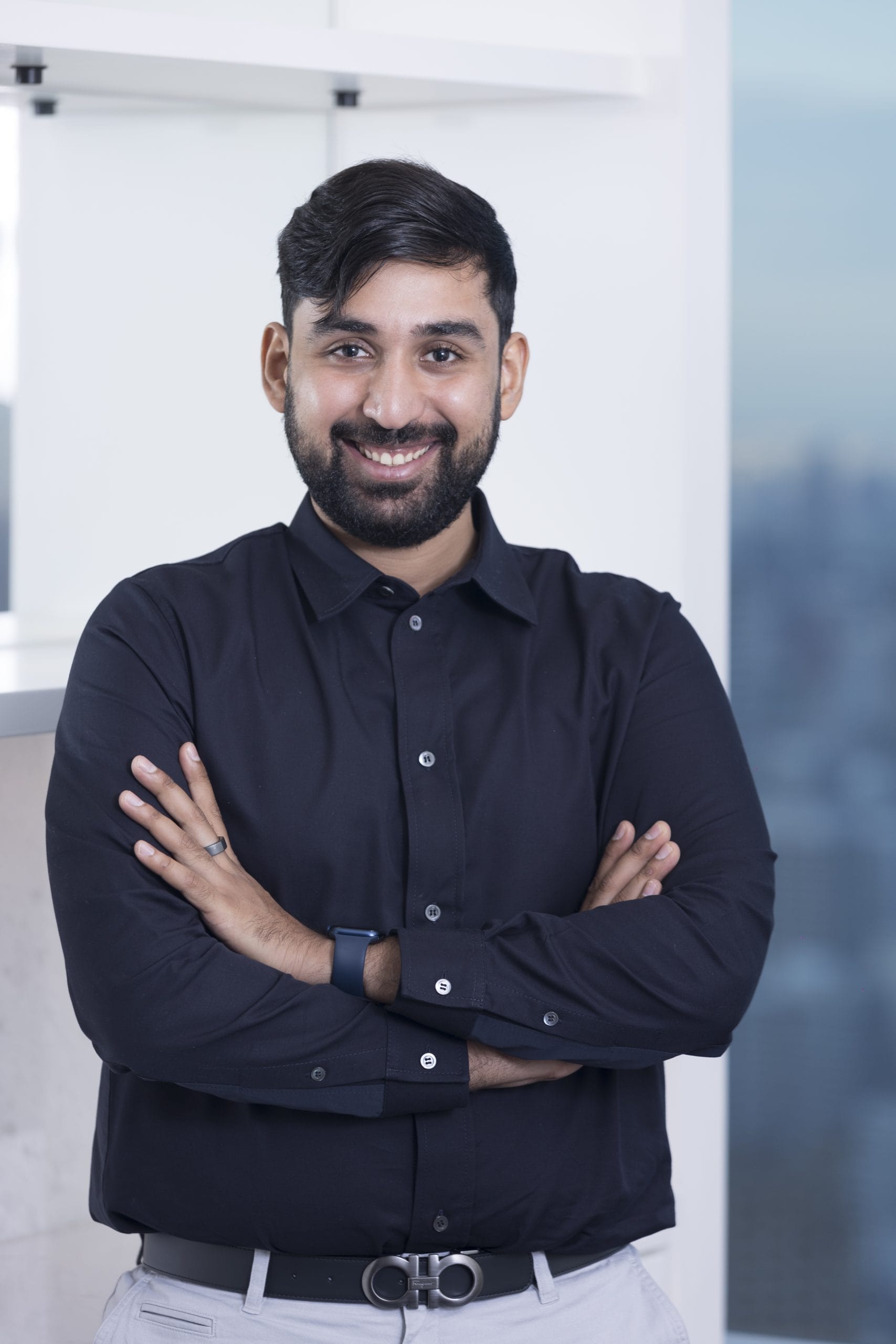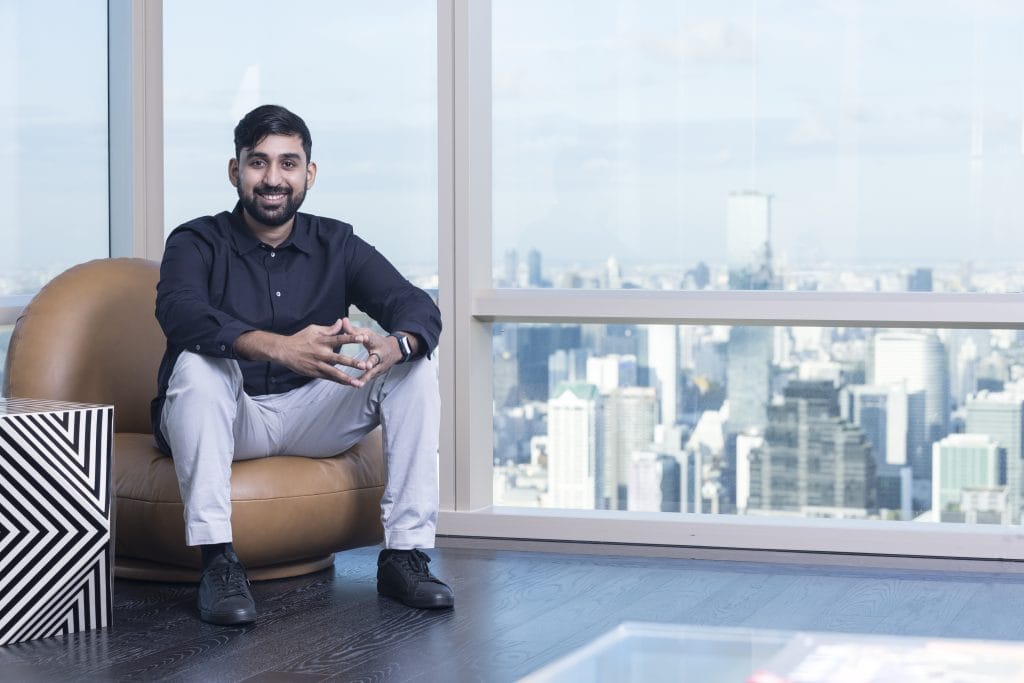How going meta has impacted his life.
By Aiden Jewelle Gonzales
While the concept of the physical and virtual joining hands has been explored time and time again in science-fiction and op-eds, since Facebook-turned-Meta gave a name to the Metaverse, our world is fast becoming inextricably linked to the virtual one.
Arthit Naidu, a 30-year-old wunderkind with a proclivity for learning everything he can about subjects he’s passionate about, has boots on the ground in this technological shift, having recently been promoted to Client Partner at Meta Thailand, and having worked in some of the technological giants of the day, Uber and Grab, before they were juggernauts in the region. “While I started my career in finance, I felt that the tech industry had so much more potential and opportunity to grow, and I really wanted to be a part of that,” he recalls.
Born in Thailand but sent to Rishi Valley School near Bangalore since the third grade, Arthit talked about how his adaptability and openness, both core values that have boosted his success over the years, were developed in the school that “was very much ahead of its time.”Having come back to Thailand and attended the International Community School (ICS) before receiving an ASEAN scholarship from the Singaporean government to study at the “crazy competitive” Anglo- Chinese School Independent, he finished the I.B. there before graduating with a business degree at the Hong Kong University of Science and Technology.
“Though I initially wanted to be a doctor, I realised I wanted to explore the world and try different things,” he reveals. “At the time, Hong Kong was very much a cosmopolitan city, and that’s where I got to meet people from all over the world who broadened my horizons, some of whom are still my closest friends.”
His two areas of focus were finance and marketing, but he started his career with Deutsche Bank, which was the first job he’d gotten after graduating. “I was a research associate and then later an analyst, analysing the Thai banking industry and giving equity recommendations on how I think stocks would perform based on future earnings,” he tells me. “I was really surprised about how much I enjoyed it. It was where I picked up my critical thinking skills, as well as how to tell a story – because it’s not just about the analysis, but also building rapport with people.”
When asked about his shift to the tech field, however, Arthit waxes eloquent about the possibilities that lie therein. “One of the key projects I had at that time was to build an industry report on the fintech industry in Thailand,” he recalls. “This was pre-2017, so PromptPay hadn’t even been launched – I actually had the opportunity to listen in on the PromptPay meeting with the governors. Through this project, I researched crypto, the importance of Blockchain and how that could impact the financial sector, and I was really fascinated.”
Because of this interest, Arthit took a 15 percent pay cut when he accepted an opportunity to work with Uber in January 2017. “They hadn’t launched their food delivery business yet, just their transport business. But after my interview with them, I decided to take an Uber Moto, and I fell in love with the magic at my fingertips. So despite the pay cut, I made the decision to move, and that’s something I want to highlight. Sometimes, you have to take risks in life.”
A pre-IPO brand at the time, Arthit and his team of five scaled up the business from scratch in Thailand, from acquiring drivers and merchants, to marketing a concept that was very new to the region. “We were the first market in Southeast Asia to prove that you could be profitable with food delivery, and because of that, Uber had the proof points to scale the business in India,” Arthit says with no small amount of pride. “But in life, there’s always uncertainty. Uber was acquired by Grab, and it was quite a tumultuous time,” he says. In the end, he made the move but chose to take on a regional role based out of Singapore: “there was an adventurous part of me that wanted to explore new horizons. My team and I essentially launched Grab Food in Vietnam from scratch, again. At that time, in the country, there were competitors already, and local players had a huge market share. In a few months, we’d gotten to number one market share and within six months, we launched in 15 cities across Vietnam.”
Despite these successes, Arthit felt the pressure of such an “all-consuming” career, and chose to make the shift to big tech. “In the start-ups, things were more stressful, but they had real impact. I wanted something that was in- between that and my secure career in finance,” he says. He talks to Masala further about joining Meta, the possibilities of big tech in the future, and coping with technology’s unassailable advances.
You’ve worked in the full breadth of successful tech industries in Thailand and the region. What about Meta’s vision and USPs attracted you to joining them, and has garnered your loyalty for the past few years?
My particular job is that I manage a book of business, and I’m the full owner of that business – I own the impact that I do there. I’m basically an entrepreneur within a big company, but I’m still able to have a work- life balance because they value that in big tech.
Secondly, you get the resources of one of the biggest companies in the world. I’m not just talking about capital, but also all the high-tech tools that are available and learnings that have been done across the company from leading experts in their field. And that’s another reason too – Meta has really high-quality people working for the company. You know they always say, “if you’re the smartest person in a room, then maybe you should be in a different room”? Even now, I still feel like I should be in the same room. And I don’t mean just expertise in an industry – they’re also really holistic in other aspects of their lives, and it’s so valuable to find a workplace where you can learn from everyone you interact with. Of course, the other side of the coin is that it’s super competitive. But I value it, and that aspect is something I enjoy.
Finally, I’ve learned that the solutions that the platform provides have such a big an impact on achieving business objectives, especially for SMEs. They help them reach customers in a cheap way, and allow them to have a living, a business, with low costs.
Tell us exactly what your role within Meta entails.
99 percent of Facebook’s revenue is from ads. I do our advertising solutions in the suite of products, not just Facebook, but Instagram, WhatsApp, etc. Essentially what I do is manage a portfolio of corporate clients, and these are Tier 1 clients – think of the big companies here in Thailand that run ads. I work very closely with their management, their marketing teams, in order to best utilise our solutions, in more of a consultant role. Overall, I’m trying to help them to sell stuff in the most cost-efficient way possible on our platform, so they get the best bang for their buck, or be able to build their brand in a different way.
My other objective is to build social value, not just internally within the company but also externally. Within the company, if I had innovative ideas that I wanted to develop, I can work with certain members of my team to do that. We also are at the forefront of a lot of community-related things. For example, me personally, I want to focus on the environment. Back when I was in India, I fell in love with nature, and in the future, I want to use the learnings I’ve had to connect with the community and grow certain projects.
Previously, I was a Client Solutions Manager, and in my previous role, I was more focused on the product and solutions side. Now as a Client Partner, which is a more senior role in general, I focus more on strategy, more on connecting with senior leadership and really unlocking the business to the next level.
Everyone’s always curious about what it’s like to work in big tech – what are some surprising things that you can share about it, and do you have any recommendations for anyone hoping to work in the industry?
Things that you would expect – all the perks, the food benefits, transport benefits, having a really nice office, really good insurance, swag, these are all in line and more than what’s expected. Our main office in Palo Alto, in the US, is like Disneyland, and was even designed by the same person who designed Disneyland!
What did surprise me is the transparency within the company. I feel like it’s a very flat organisation – no matter your age, or your role, you have a voice. Mark [Zuckerberg], has a Q&A on a weekly basis, where he answers questions from the employees. Any employee can submit a question into a poll, and if it gets enough votes internally, the question is submitted to the CEO. And we employees do ask pretty difficult questions, which he has to answer live – I think this is something that builds more trust in the way that the company
operates, from the inside. In terms of how to enter big tech – I didn’t get this job on my first try. I had to go through almost 16 interviews in order to actually get the job so my point is, be persistent. And if you know someone in the company, ask them to refer you – employees are actually incentivised to refer people because if they get hired, you get benefits.
Tell us a little about the technological trends that you foresee in the next few years, based on your experience, and some technological trends that have surprised you in the last few years.
The key trend right now is about privacy. Last year, Apple came up with the iOS 14 App Tracking Transparency feature, where you can opt into whether or not you want to be tracked. Android is planning to do that this year, and in general Google and Safari are planning to remove cookies from their sites. Precision marketing, which is super personalised marketing, is in an apocalypse. We call it the cookie apocalypse [Laughs]. This disproportionately affects smaller businesses rather than big businesses, but if you’re an SME, you can bet that we’re investing a lot on new technologies to minimise the impact.
For those on the consumer side, I can tell you that on our side, we’re very strict with consumer and client privacy. I don’t have access to any other data except for my clients’. It’s all sandboxed. One thing I recommend is that in every ad that you see, click the info button, and you can ask, ‘why am I seeing this ad?’ It’ll tell you exactly why – maybe you recently went to a certain website, or searched something similar recently.
One other trend that technology has enabled is this concept of the creator universe – the ability for anyone to become a creator. It’s created a whole new opportunity for people. Before, when we were younger, we were brought up to aim to work in corporate, or go be a doctor or lawyer. But now, people are building businesses purely out of the content that they’ve created, and I think that this is only going to continue growing. As AIexponentially improves in its ability, technical skills such as coding, etc. can be automated. The key difference in us humans lies in our creativity. I believe that having that skill set, and continuing to pursue your passion in creating content, is important to pursue.
Facebook has recently rebranded to Meta – can you weigh in with your personal thoughts on the metaverse?
What is the metaverse really? It’s a seamless conversion of our physical and digital lives to create a unified virtual community. It’s a new computing platform where we’re going to spend our time, and Meta has bet on that. One thing I want to note is that the company doesn’t plan to own the metaverse – it’s something for everyone; like a blockchain. Meta is just creating tools to enable a great experience in the metaverse, whether that’s avatars, or content creation tools, or virtual spaces. The name change is just putting a flag on the ground, to say, “we are the future”.
What do I think of the metaverse in the future? It’s already here now, to some extent. If you think about AR filters, that’s already seamlessly marrying the digital and the physical; same with virtual avatars, even Zoom calls,
online gaming, or fitness solutions like Peloton. Another key use case is B2B, where you can have meetings online in a way that feels like it’s real. If you haven’t watched Mark’s 2021 keynote where he introduces the metaverse, you should – a lot of what he’s talking about is already happening, such as Ariana Grande’s virtual concert.
Another aspect that I think is going to be important, is the element of social connection is going to change. Visualise the holograms in Star Wars – that’s what we’re heading towards. Commerce will also change, with Web3, NFTs, cryptocurrencies, all of which are already in the metaverse. It reminds me a little of when I was doing my fintech paper, when you’re just imagining what things could be like, but look how far the market has come. The only limitation right now is hardware.
As someone who’s in technology, how do you continuously upskill yourself to keep up to date? How can we ourselves keep up with the technological revolution?
I have this habit from back in my banking days, every morning that I wake up, the first thing I do is read the news and I still do that – but I’ve just added a lot more tech-focused resources. When I find something that I’m interested in, then I really try to focus and go deep on that, whether it’s buying a book or reading essays about it. If there’s a skill set that I really want to grow further, I see if there’s an online course that I can take. For example right now, I decided that I want to grow my technical capabilities even more, so I decided to do a purely online Bachelor’s in Computer Science on the side.
These are all tools, but another aspect is really networking and talking to people in the industries. Finding out what’s new, what’s interesting, going for those coffee chats, those lunches. Finally, go and actually play in e.g. Decentraland or Sandbox in the metaverse. You learn a lot more that way than just reading about it.
What do you attribute your success to?
Number one are my parents, they were the ones who brought me up and guided me to my education. I attribute a lot of my success to them and what they built to allow me my choices. My number one inspiration in my corporate career has been my mum. She was a woman in finance back when it was only men in finance; she went through all the financial crises in the last few decades, she’s super respected in her field, and she’s still working now, and she works out of her passion. So seeing her passion with her job, and how hard she works, was a huge inspiration for me growing up. Even if I’m not in the same field as her, I carry a lot of that work ethic, that passion. She’s still my go-to for advice.
Finally, my friends, too, have been key pillars of support. They’ve been with me through my ups and downs, no matter the situation. Whether it’s advice, or things I do, or just giving me that emotional stability – that can make all the difference.









